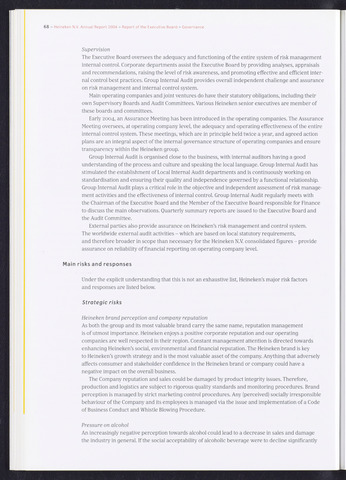Strategic risks
68 Heineken N.V. Annual Report 2004 Report of the Executive Board Governance
Supervision
The Executive Board oversees the adequacy and functioning of the entire system of risk management
internal control. Corporate departments assist the Executive Board by providing analyses, appraisals
and recommendations, raising the level of risk awareness, and promoting effective and efficient inter
nal control best practices. Group Internal Audit provides overall independent challenge and assurance
on risk management and internal control system.
Main operating companies and joint ventures do have their statutory obligations, including their
own Supervisory Boards and Audit Committees. Various Eleineken senior executives are member of
these boards and committees.
Early 2004, an Assurance Meeting has been introduced in the operating companies. The Assurance
Meeting oversees, at operating company level, the adequacy and operating effectiveness of the entire
internal control system. These meetings, which are in principle held twice a year, and agreed action
plans are an integral aspect of the internal governance structure of operating companies and ensure
transparency within the Heineken group.
Group Internal Audit is organised close to the business, with internal auditors having a good
understanding of the process and culture and speaking the local language. Group Internal Audit has
stimulated the establishment of Local Internal Audit departments and is continuously working on
standardisation and ensuring their quality and independence governed by a functional relationship.
Group Internal Audit plays a critical role in the objective and independent assessment of risk manage
ment activities and the effectiveness of internal control. Group Internal Audit regularly meets with
the Chairman of the Executive Board and the Member of the Executive Board responsible for Finance
to discuss the main observations. Quarterly summary reports are issued to the Executive Board and
the Audit Committee.
External parties also provide assurance on Heineken's risk management and control system.
The worldwide external audit activities - which are based on local statutory requirements,
and therefore broader in scope than necessary for the Heineken N.V. consolidated figures - provide
assurance on reliability of financial reporting on operating company level.
Main risks and responses
Under the explicit understanding that this is not an exhaustive list, Heineken's major risk factors
and responses are listed below.
Heineken brand perception and company reputation
As both the group and its most valuable brand carry the same name, reputation management
is of utmost importance. Heineken enjoys a positive corporate reputation and our operating
companies are well respected in their region. Constant management attention is directed towards
enhancing Heineken's social, environmental and financial reputation. The Heineken brand is key
to Heineken's growth strategy and is the most valuable asset of the company. Anything that adversely
affects consumer and stakeholder confidence in the Heineken brand or company could have a
negative impact on the overall business.
The Company reputation and sales could be damaged by product integrity issues. Therefore,
production and logistics are subject to rigorous quality standards and monitoring procedures. Brand
perception is managed by strict marketing control procedures. Any (perceived) socially irresponsible
behaviour of the Company and its employees is managed via the issue and implementation of a Code
of Business Conduct and Whistle Blowing Procedure.
Pressure on alcohol
An increasingly negative perception towards alcohol could lead to a decrease in sales and damage
the industry in general. If the social acceptability of alcoholic beverage were to decline significantly

